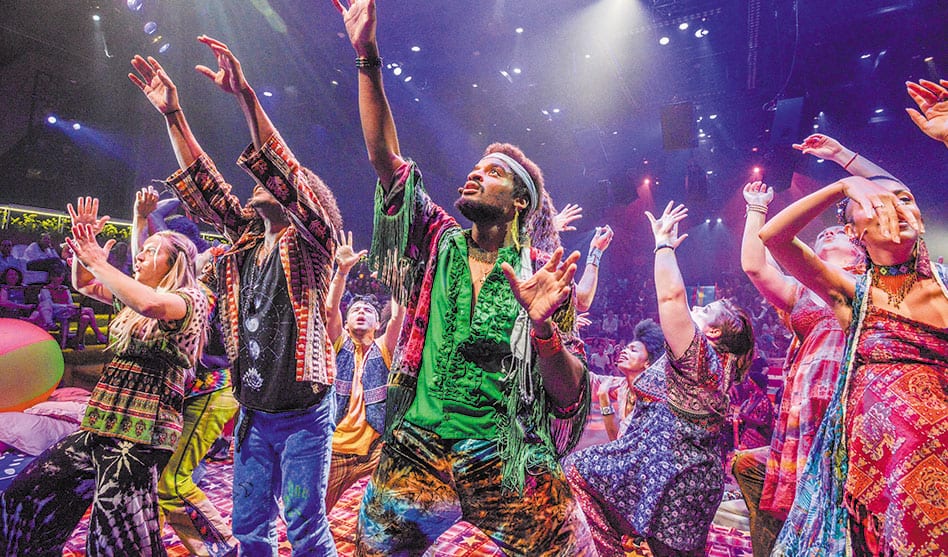Nearly 50 years after it revolutionized theater, DTC’s revival lets its ‘Hair’ down. (Photo courtesy Karen Almond)
A blast from the past or a rude awakening in Trumplandia?
 Born out of the Summer of Love, great sex and really great drugs, the 1968 musical Hair redefined “radical influence” for a modern world. And recreating that feel is what Kevin Moriarty, who is directing the Dallas Theater Center’s current revival, is trying to do… but nearly 50 years later.
Born out of the Summer of Love, great sex and really great drugs, the 1968 musical Hair redefined “radical influence” for a modern world. And recreating that feel is what Kevin Moriarty, who is directing the Dallas Theater Center’s current revival, is trying to do… but nearly 50 years later.
“Hair took a pretty radical vision for how musical theater could engage [its audience],” says Moriarty, artistic director at DTC. “It talked about politics, race, sexuality and gender at a time when much mainstream entertainment was still very cautious.”
In order to capture the revolutionary qualities of a show subtitled The American Tribal Love Rock Musical, Moriarty started by breaking the rules for how the audience would see the action. Couches, barber chairs, bleachers — none of the seats that clutter the stage of the Wyly Theatre are the same. But every vantage point affords each audience member a personalized and unique experience. He wants the show to feel less formal than sitting politely forward like church or court, and he created a theater-in-the-round to force audiences out of their comfort zones and to get them to engage in the show as an experience.
“Rather than building a set that people look at, we have built a set that takes up the entire room,” Moriarty says. “The audience is in the set — immersed in a happening in the Summer of Love.”
“It is not a linear storytelling piece — it’s really about a place, time and culture and the ideas they explore with a little more depth,” explains Joel Ferrell, producer of Hair and associate artistic director at DTC. “It’s about letting yourself experience it like you would experience an abstract painting or music or modern dance.”
Hair has been a lightning rod for controversy since its debut, from the pop-music score by composer Galt McDermott and librettists Jerome Ragni and James Rado. It portrays sex, drug use, defiance of authority and anti-war activism — things not uncommon nowadays even in mainstream theater, but shocking to Broadway audiences in 1968. And in addition to bringing up uncomfortable, abstract and even taboo topics, Hair further pushed cultural boundaries and exposed — literally — the raw beauty covered up by institutions’ rigid rules regarding race and self-expression. (Hint: The actors get naked.)
“Stranger things have happened in our theater,” Ferrell jokes. “Everything we construct about ourselves is simply just construction, we are all just somewhere in between birth and decay. When the tribe becomes nude, it is strikingly beautiful. We are so much more similar than we are different.”
Instead of leaving things unsaid, everything is put out on the table in this production, picked apart and redefined.
“This is very much meant to be seen as daring in the sense of removing man-made ridiculous barriers that separate human beings,” Ferrell says. “I don’t know if a year ago or a year from now if it would have such an impact [as it has now].”
The unique and rebellious production of Hair parallels what is seen today: sit-ins, protests and an overall lack of trust in who we look to for guidance. George Orwell’s 1984 meets 1967 in a way to define what our world is today.
“2017 is shocking similar to 1967,” Moriarty says. “America today has a crisis in our institutions; there are people across the political spectrum who don’t believe our government, don’t believe what the president says, don’t believe in religious leaders. When confronted with a loss of belief in the institutions, what are we going to do? Are we going to face those institutions and tear them down, or are we going to create a radically new society that does not rely on the institution? This is the exact question we faced in America in 1967.”
— Emma Bittner

